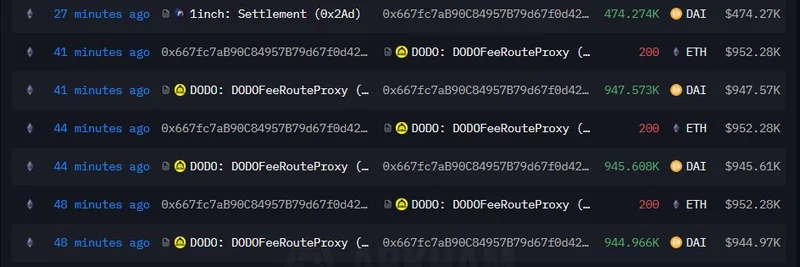Hey there, crypto enthusiasts! If you've been keeping an eye on the blockchain world, you might have caught wind of some fresh activity from an old exploit. Today, we're breaking down a recent tweet from OnchainLens that spotlights the Radiant Capital hacker making moves again. Let's unpack this step by step, keeping things simple and straightforward.
Background on the Radiant Capital Hack
First off, a quick refresher: Radiant Capital is a popular DeFi (Decentralized Finance) lending platform that allows users to borrow and lend crypto assets across different blockchains. Back on October 17, 2024, it suffered a massive hack, losing around $53 million in user funds. According to reports, the attack was sophisticated—hackers, believed to be linked to North Korean groups, used malware to compromise developers' devices. This tricked hardware wallets into signing malicious transactions, transferring control of smart contracts and draining the funds.
For more on the incident, check out this detailed explanation from Halborn. It's a stark reminder that even with top-notch security tools like hardware wallets, human error or malware can still open doors for bad actors.
The Latest Move: Selling ETH for DAI
Fast forward to August 14, 2025—almost a year later—and the exploiter is back in action. As highlighted in the tweet by @OnchainLens, the hacker sold 2,496 ETH (Ethereum's native token) for a whopping $11.83 million in DAI, a stablecoin pegged to the US dollar. The sale happened at an ETH price of about $4,741, which is interesting given the market fluctuations.
DAI is often favored in such scenarios because it's decentralized and less likely to be frozen compared to more centralized stablecoins like USDT or USDC. The transactions were routed through platforms like DODO, a decentralized exchange, to swap ETH for DAI in chunks.
Here's a screenshot from the on-chain data showing some of these swaps:
And another view labeling the inflows, including one potentially directly from the exploiter's address:
You can dive deeper into the address activity on Arkham Intelligence.
Why This Matters for the Crypto Community
This isn't just another transaction—it's a signal that exploiters are patient and strategic. Holding onto stolen funds for months before cashing out helps them avoid immediate scrutiny and potentially launder the assets more effectively. For DeFi users, it underscores the importance of platform security audits and personal vigilance. If you're into meme tokens or any blockchain projects, remember that hacks like this can ripple through the market, affecting liquidity and trust.
Radiant Capital has been working on recovery efforts, including proposals to compensate affected users. They've shared updates on their progress here. Meanwhile, attributions to North Korean hackers, as noted by CoinDesk, highlight the geopolitical angles in crypto crimes.
Key Takeaways and Tips
- Stay Informed: Tools like OnchainLens make it easier to track whale movements and suspicious activities. Following them can give you an edge in spotting trends.
- Security First: Use hardware wallets, but double-check transactions. Enable multi-factor authentication and avoid suspicious downloads.
- Market Impact: Large sell-offs like this could influence ETH prices, though in this case, it was done in smaller batches to minimize slippage.
If you're building or investing in meme tokens, DeFi exploits serve as a blueprint for what not to do. Keep your smart contracts audited and your community informed. What do you think—will we see more of these funds moved soon? Drop your thoughts in the comments!
For the latest on meme tokens and blockchain news, stick with us at Meme Insider.




